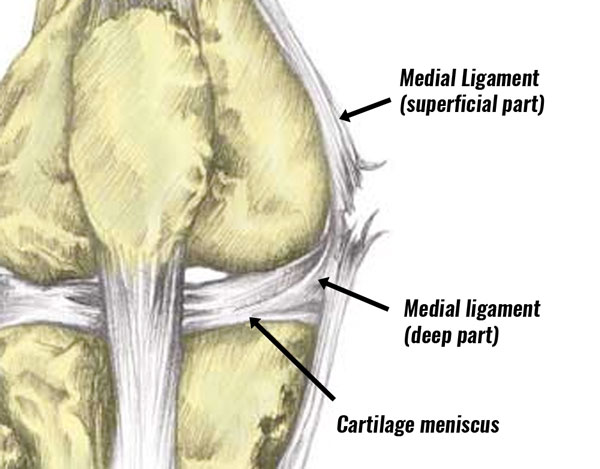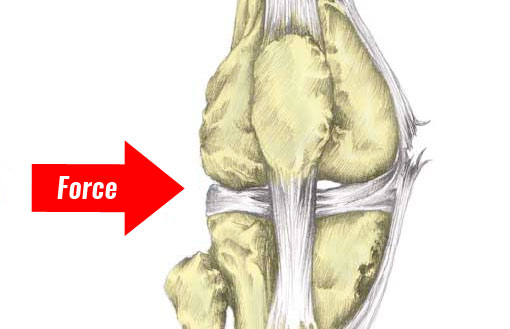A medial collateral knee ligament sprain or MCL sprain is a tear of the ligament on the inside of the knee. It usually occurs suddenly from twisting or direct impact. However, it may develop gradually over time. Our full MCL rehab program takes you step-by-step from initial injury to full fitness.
Medically reviewed by Dr Chaminda Goonetilleke, 5th Dec. 2021
MCL sprain symptoms
Symptoms of a Medial knee ligament sprain include:
- Pain and/or tenderness on the inside of your knee
- Rapid swelling (but not always)
- An uncomfortable or weak knee joint
- A positive result for the valgus stress test
MCL sprains are graded 1, 2, or 3 depending on the severity with a grade of 1 as mild and 3 as most severe.
What is an MCL sprain?
An MCL sprain or medial collateral ligament sprain is a tear or stretching of the medial ligament on the inside of the knee.
Anatomy

The medial collateral ligament (MCL) connects the thigh bone (femur) to the shin bone (tibia) on the inside of your knee. It provides stability to your knee, preventing movement, in particular from forces to the outside of the knee.
The MCL itself has two parts to it:
- A deep section of the ligament attaches to the cartilage and capsule in the knee
- Also, a superficial band originates in the lower part of the femur and attaches to an area on the upper and inside surfaces of the tibia
What causes an MCL sprain?
MCL sprains usually occur suddenly as acute knee injuries, however, they can develop gradually over time.
Sudden onset/acute injuries
Medial collateral ligament injuries are common in contact sports such as football, rugby, and martial arts. However, they can also occur in daily activities such as falling and/or twisting action your knee joint.
Direct trauma

Injury to the MCL often occurs from a direct impact to the outside of your knee. In particular, when your knee is slightly bent.
As a result, the medial ligament on the inside of your knee becomes stretched and if the force is great enough, some or even all of the fibres will tear. The deep part of the ligament is prone to becoming damaged first. This may lead to a medial cartilage meniscus injury.
Twisting
Twisting your knee can also cause a medial ligament sprain, which may also result in an ACL tear.
Attempting to turn quickly, when your foot is firmly planted on the ground will result in a twisted knee. As a result, the inside of the joint opens, tearing the medial ligament.
Gradual onset MCL sprains
Repetitive sideways forces on your knee (known as valgus forces) can gradually, over time lead to an MCL sprain. For example, repeatedly kicking a football with the inside of your foot. Or kicking in martial arts.
However, gradual onset pain on the inside of your knee should also be considered for pes anserine tendinopathy or bursitis.
Medial Collateral knee ligament injuries treatment
Initial treatment for Medial Collateral knee ligament injuries should be to apply the cold therapy PRICE principles of protection, rest, ice, compression, and elevation. Our treatment protocol includes:
- Cold therapy & compression
- Massage
- Taping
- Exercises
